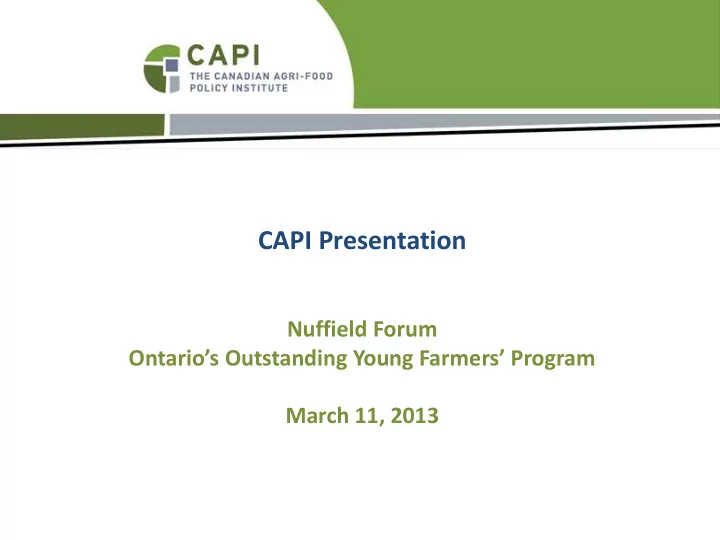

CAPI Presentation Nuffield Forum Ontario’s Outstanding Young Farmers’ Program March 11, 2013
What are the Is there a How best cope key drivers of “status quo”? with change? strategy? 2
1. Trade developments
Canada’s deteriorating trade balance in processed food
Becoming a net importer of beef Canada’s beef trade balance with the US ($value): $1.4 billion (2002) vs. $42 million (2011) 5
Exporting lower value / Importing higher value 60% ↑ In 2011, Cdn beef exports to US averaged $3.74/kg. US beef exports to Canada averaged $6.55/kg. 6
Value of Canada’s beef exports – by country 2010 7
2. Population health
2. Costs of healthcare 9
Diet 2 billion overweight & 1 billion obese 10
Environmental pressures 3 inches …impacted 450,000 acres of prime California agriculture land 11
Population growth …. 12
Societal & Financial Risk – Moody’s Report
3. How we think about “food”
Rising consumer expectations & concerns … Transparency is paramount 15
Challenging what is produced 16
Goals: Sustainable sourcing from: beef, poultry, coffee, palm oil, fish and fiber Source 100% Canadian beef & pork Phase out gestation stalls McDonald’s Global Sustainability Scorecard 17
Goal: Source 100% of its agricultural raw materials sustainably. Unilever Sustainable Living Plan 2010 18
Goals: In Canada: purchase 30% of produce locally (when available) In the US: double the amount of locally grown produce by 2015 Sell certified sustainable fish by end of 2013 Walmart 19
Goals: Develop a Canadian sourcing policy 100% seafood sourced from sustainable sources (2013) Source all PC eggs from cage-free operations Loblaw Corporate Social Responsibility Summary 20
Goal: Reduce emissions per gallon of milk by 25% by 2020 Innovation Centre for U.S. Dairy Sustainability Commitment Progress Report 21
What are the Is there a How best cope key drivers of “status quo”? with change? strategy? 22
Systems thinking 23
From “vision” to “destination” … 2011 24
Shifting the perspective Input Producers Processors Distributors Wholesalers Retailers suppliers 25
Food system Consumers Ecological systems: water, soil, carbon Restaurants; food services Academics, scientists, researchers Retailers (grocery) Entrepreneurs; financial services Wholesalers Adjacent sectors: e.g. health, environment Distributors Governments (3 levels) Processors Transportation; ports Producers Packaging, equipment, info technology Input suppliers By-products; bio-applications
Food system Consumers Ecological systems: water, soil, carbon Restaurants; food services Academics, scientists, researchers Retailers (grocery) Entrepreneurs; financial services Healthy Reliable Wholesalers population supply Adjacent sectors: e.g. health, environment Responsibly- Distributors produced food Governments (3 levels) “Metrics” Processors Transportation; ports Producers Packaging, equipment, info technology Input suppliers By-products; bio-applications
New way of thinking… 1. Lack of alignment; silos 2. No shared long-term strategy 3. Too many voices; need for leadership 2012
Increase profitability 1. Retailer: needing to differentiate 2. Processor: needing to maximize carcass value (diverse markets) 3. Feeder & rancher: needing value from attributes in demand → The role of “information”
Collaboration Blade Farming, UK Ontario Corn Fed Beef Program Canadian Angus Program Meat & Livestock Australia 30
What are the Is there a How best cope key drivers of “status quo”? with change? strategy? 31
Implications for Strategy
Isolating what drives effective strategy ❶ Shared acknowledgement of ‘the burning platform’ ❷ Industry must lead – champions can galvanize action ❸ Collaboration across the supply chain, and among food system players ❹ Common objectives (consumer focus); basis for alignment ❺ Information-sharing: basis to act
Thank you
Recommend
More recommend